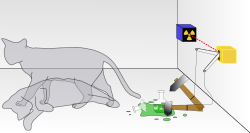Thocht experiment
A thocht experiment or Gedankenexperiment (frae German) considers some hypothesis, theory,[1] or principle for the purpose o thinkin throu its consequences.

References
eedit- ↑ "[C]onjectures or hypotheses ... are really to be regarded as thought "experiments" through which we wish to discover whether something can be explained by a specific assumption in connection with other natural laws." —Hans Christian Ørsted("First Introduction to General Physics" ¶16-¶18, part of a series of public lectures at the University of Copenhagen. Copenhagen 1811, in Danish, printed by Johan Frederik Schulz. In Kirstine Meyer's 1920 edition of Ørsted's works, vol.III pp. 151-190. ) "First Introduction to Physics: the Spirit, Meaning, and Goal of Natural Science". Reprinted in German in 1822, Schweigger's Journal für Chemie und Physik 36, pp. 458–488, as translated in Ørsted 1997, pp. 296–298